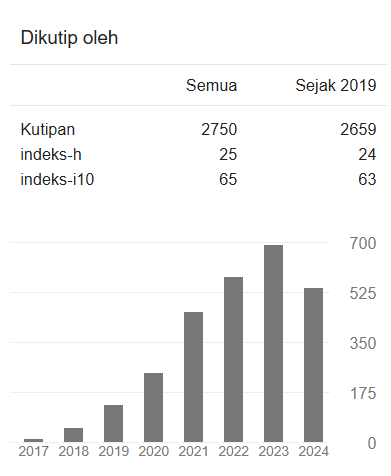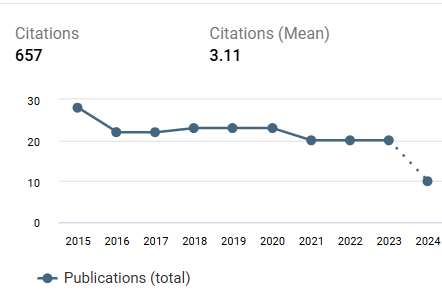Pengembangan buku ajar mata kuliah belajar dan pembelajaran berbasis moodle
DOI:
https://doi.org/10.22219/jinop.v7i1.13856Keywords:
Teaching Book, Belajar dan Pembelajaran, MOODLEAbstract
Belajar dan Pembelajaran (learning and teaching learning) requires high analytical skills, flexible time, and supporting learning media, one of which is books. This research aims to design and develop teaching books for Belajar dan Pembelajaran that are MOODLE-based. This research employed Research and Development (R&D) method with the ADDIE technique. Participants of this research are second-semester students of the PJKR IKIP Budi Utomo Program (the year 2019-2020) who took the Belajar dan Pembelajaran course. Questionnaire technique was employed to determine the feasibility of teaching books, and to test student learning outcomes after using MOODLE-based teaching books. The standard assessment of content from media experts is 57 with a percentage of 95%, referring to very good criteria without revision. The visual standard assessment from media experts is 61 with a percentage of 94%, referring to very good criteria without revision. The content standard assessment from material experts is 48 with a percentage of 80%, referring to very good criteria without revision. The visual standard assessment from material experts is 53 with a percentage of 82%, referring to very good criteria without revision. Teaching books’ effectiveness (N-gain) is 0.52 on moderate criteria.
Downloads
References
Adalikwu, S. A., & Iorkpilgh, I. T. (2013). The Influence of Instructional Materials on Academic Performance of Senior Secondary School Students in Chemistry in Cross River State. Global Journal of Educational Research, 12, 39–45.
Dick, W., & Carey, L. (2001). The Systemic Design of Instruction. United State: Addison-Wesley Educational Publishers Inc.
Herayanti, L., Fuaddunnazmi, M., & Habibi, H. (2017). Pengembangan Media Pembelajaran Berbasis Moodle pada Mata Kuliah Fisika Dasar. Jurnal Pendidikan Fisika Dan Teknologi, 1(3), 205. https://doi.org/10.29303/jpft.v1i3.260
Irawan, R., & Surjono, H. D. (2018). Pengembangan E-Learning Berbasis Moodle dalam Peningkatkan Pemahaman Lagu pada Pembelajaran Bahasa Inggris. Jurnal Inovasi Teknologi Pendidikan, 5(1), 1–11. https://doi.org/10.21831/jitp.v5i1.10599
Januszewski, A., & Molenda, M. (2008). Educational Technology: A Definition with Commentary. New York: Routledge.
Khoir, M. H., Murtinugraha, R. E., & Musalamah, S. (2020). Pengembangan Media Pembelajaran E-Learning Berbasis Moodle Pada Mata Kuliah Metodologi Penelitian. Jurnal PenSil, 9(1), 54–60. https://doi.org/10.21009/jpensil.v9i1.13453
Kirom, A. (2017). Peran Guru dan Peserta Didik dalam Proses Pembelajaran Berbasis Multikultural. AL MURABBI (Vol. 3). Retrieved from http://jurnal.yudharta.ac.id/v2/index.php/pai
Kurniawan, A., & Masjudin, M. (2018). Pengembangan Buku Ajar Micro Teaching Berbasis Praktik untuk Meningkatkan Keterampilan Mengajar Calon Guru. In Prosiding Seminar Nasional Pendidik dan Pengembang Pendidikan Indonesia (Vol. 0, pp. 9–16). Retrieved from http://ejournal.mandalanursa.org/index.php/Semnas/article/view/166
Maulana, I. (2020). Pengembangan E-Learning Berbasis MOODLE di SMK Al Washliyah Sumbr. Jurnal Media Aplikom, 12(1), 1–12. https://doi.org/10.33488/1.ma.2.1.247
Meltzer, D. E. (2002). The Relationship Between Mathematics Preparation and Conceptual Learning Gain in Physics: A Possible Inhidden Variablei in Diagnostic Pretest Scores. :Department of physics and Astronomy,Lowa State University: Ames.
Murtikusuma, R. P., Fatahillah, A., & Monalisa, L. A. (2017). Pengembangan Rancangan Pembelajaran Matakuliah Kombinatorika Berbasis Kerangka Kualifikasi Nasional Indonesia (KKNI) dan Local Wisdom. Jurnal Edukasi, 4(3), 41. https://doi.org/10.19184/jukasi.v4i3.6300
Nurdin, S. (2018). Pengembangan Kurikulum dan Rencana Pembelajaran Semester (RPS) Berbasis KKNI di Perguruan Tinggi. Al-Fikrah: Jurnal Manajemen Pendidikan, 5(1), 21. https://doi.org/10.31958/jaf.v5i1.813
Pengelolaan Kekayaan Intelektual, Direktorat Jenderal Penguatan Riset dan Pengembangan, & Kementerian Riset, Teknologi, dan Pendidikan Tinggi, D. (2018). Panduan Pengajuan Usulan Program Intensif Buku Ajar Terbit Tahun 2018. Retrieved from http://simlitabmas.ristekdikti.go.id/kinerja
Pradipta, A. W., & Wardathi, A. N. (2018). ANALISIS PROSES PENGEMBANGAN E-LEARNING BERBASIS MOODLE V.3.1. PADA MATA KULIAH BELAJAR DAN PEMBELAJARAN. JINoP (Jurnal Inovasi Pembelajaran), 4(2), 113-122. https://doi.org/10.22219/jinop.v4i2.6576
Prastowo, A. (2012). Panduan Kreatif Membuat Bahan Ajar Inovatif. Jogjakarta: Diva Press.
Prayogo, M. A. (2018). Pengembangan Buku Ajar Matakuliah Belajar dan Pembelajaran dalam bidang Informatika untuk Prodi S1 Pendidikan Teknik Informatika Jurusan Teknik Elektro di Universitas Negeri Malang. Tugas Akhir Jurusan Teknik Elektro - Fakultas Teknik UM. Universitas Negeri Malang, Malang. Retrieved from http://karya-ilmiah.um.ac.id/index.php/TA-Elektro/article/view/72377
R, M., Amir, A., Yusri, Y., & Anwar, M. (2019). Analisis Kebutuhan Penyusunan Buku Ajar Tata Bahasa Jerman. Eralingua: Jurnal Pendidikan Bahasa Asing Dan Sastra, 3(2). https://doi.org/10.26858/eralingua.v3i2.10062
Rahman, R. A. (2019). Penyusunan Design Kurikulum Berbasis Kkni Pada Program Studi Tadris Bahasa Inggris PTKIN (Studi Kasus Pada Iain Bengkulu dan STAIN Curup). Manhaj: Jurnal Penelitian Dan Pengabdian Masyarakat, 3(2), 51. https://doi.org/10.29300/mjppm.v3i2.2369
Setiawan, D. (2017). Pengembangan Model Kurikulum Berorientasi KKNI di Fakultas Ilmu Sosial Universitas Negeri Medan. JUPIIS: JURNAL PENDIDIKAN ILMU-ILMU SOSIAL, 9(2), 112. https://doi.org/10.24114/jupiis.v9i2.8239
Siagian, B. A., & Siregar, G. N. S. (2018). Analisis Penerapan Kurikulum Berbasis KKNI di Universitas Negeri Medan. JURNAL Suluh Pendidikan FKIP-UHN, 5(2), 21–35. Retrieved from https://jsp.uhn.ac.id
Sudjana, N. (2013). Dasar-Dasar Proses Belajar Mengajar. Bandung: Sinar Baru Algensindo.
Sugiyono. (2013). Metode penelitian kombinasi (mixed methods). Bandung: Alfabeta.
Surahman, F., & Yeni, H. O. (2019). Pengembangan Buku Ajar Mata Kuliah Renang Bagi Mahasiswa Pendidikan Jasmani Kesehatan dan Rekreasi. Journal Sport Area, 4(1), 218–229. https://doi.org/10.25299/sportarea.2019.vol4(1).2413
Suwartini, S. (2018). Pengembagan Buku Ajar Pendidikan Karakter dengan Pendekatan Pembelajaran Berbasis Soft Skill pada Siswa SD Kelas II. Jurnal Educhild : Pendidikan Dan Sosial, 7(2), 102–106. https://doi.org/10.33578/JPSBE.V7I2.6520
Ulfa, M., & Yulianto, B. (2019). Relevansi Model Kurikulum BOBBIT dalam KKNI Pembelajaran Bahasa dan Sastra Indonesia. BELAJAR BAHASA, 4(2), 169. https://doi.org/10.32528/bb.v4i2.2554
Waseso, H. P., & Hidayat, M. S. (2017). Penerapan Kurikulum Berbasis KKNI pada Prodi PGMI Unsiq Jawa Tengah. JIP: Jurnal Ilmiah PGMI, 3(1), 33–48. https://doi.org/10.19109/jip.v3i1.1376
Wiyono, B. D., Muis, T., & Khusumadewi, A. (2018). Pengembangan Blended Learning Mata Kuliah Dinamika Kelompok untuk Mahasiswa Jurusan Bimbingan Dan Konseling. Jurnal Bimbingan Dan Konseling Terapan, 2(2), 168. https://doi.org/10.30598/jbkt.v2i2.375
Downloads
Published
How to Cite
Issue
Section
License
Copyright (c) 2021 Pradipta et al

This work is licensed under a Creative Commons Attribution 4.0 International License.
Copyright Notice
Authors who publish with JINoP (Jurnal Inoasi Pembelajaran) agree to the following terms:
- For all articles published in the JINoP (Jurnal Inovasi Pembelajaran), copyright is retained by the authors. Authors give permission to the publisher to announce the work with conditions. When the manuscript is accepted for publication, the authors agree to the automatic transfer of the publishing right to the publisher.
- Authors retain copyright and grant the journal the right of first publication with the work simultaneously licensed under a Creative Commons Attribution 4.0 International License. that allows others to share the work with an acknowledgment of the work's authorship and initial publication in this journal.
- Authors are able to enter into separate, additional contractual arrangements for the non-exclusive distribution of the journal's published version of the work (e.g., post it to an institutional repository or publish it in a book), with an acknowledgment of its initial publication in this journal.
- Authors are permitted and encouraged to post their work online (e.g., in institutional repositories or on their website) prior to and during the submission process, as it can lead to productive exchanges, as well as earlier and greater citation of published work (See The Effect of Open Access).








